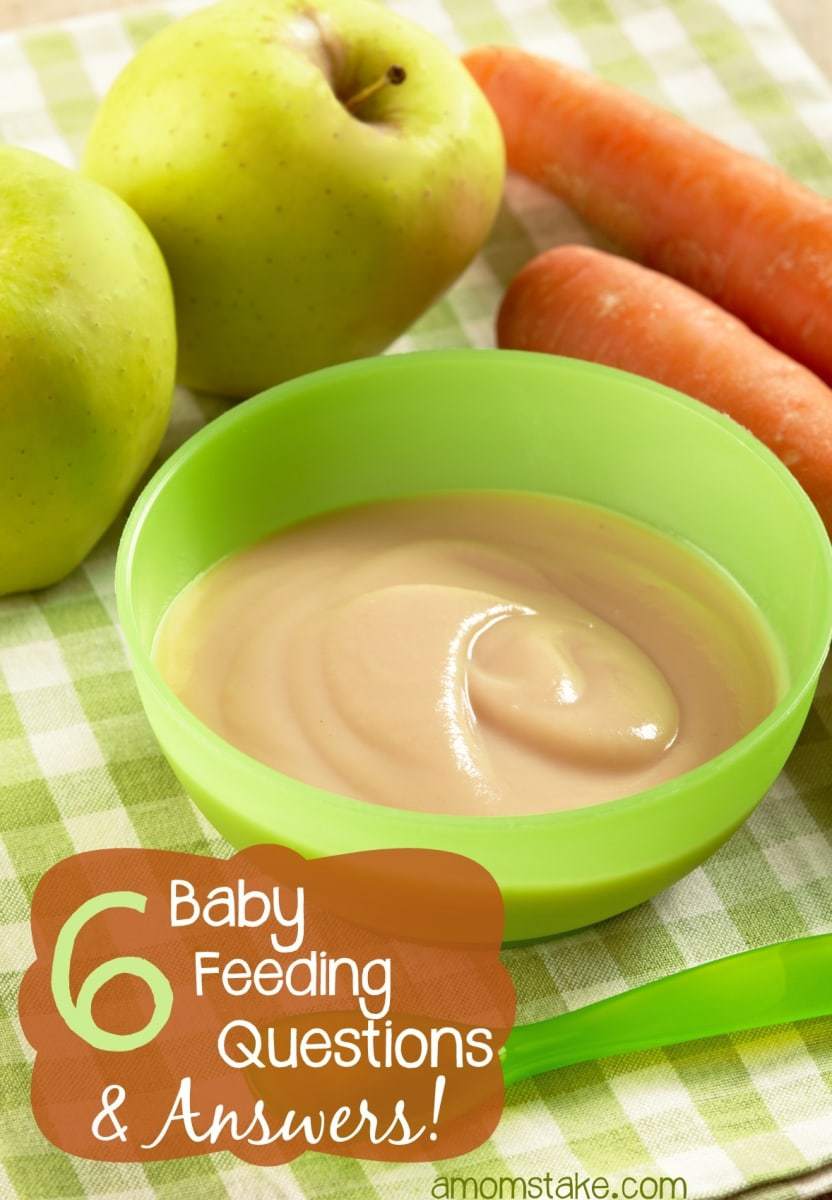I am a Similac ambassador and received compensation for this post.
I can remember with my first baby how many, many questions I asked. It seemed like every day I would have something new I was not sure of as a new mommy. I would often turn to my own mom, my friends, and often the internet to figure out how to tackle the latest question from what developmental milestones should my child know to how to recognize an ear infection, and every question in between. It’s so wonderful that we have all of the online resources available to us now to help find mom advice and expert knowledge no matter what question we might face.
What really surprised me, though, is that the questions come right back around with future children. Even though I have four boys, I still wonder and question every time they start to age certain questions about feeding like when to start solids or what solid to introduce first. Here’s a picture of feeding my 3rd son solids for the first time.

It always cracks me up to see their faces turn in surprise or disgust when trying solids for the first time.
6 Common Baby Feeding Questions and Answers
Similac asked real parents what some of their most common feeding questions were, and then sought the expert advice of pediatrician Dr. Sue Hubbard to answer these common questions as a resource for moms. Here are 6 common baby feeding questions and answers that can help new parents navigate the tricky waters of raising a baby.

Q: What can I do to ease my baby’s digestive problems?
A: Many babies are gassy and intermittently fussy during the first two months of life as their GI tract is immature, but over time their tummies mature. Although parents want to “solve the gassy problem” it may take a bit of time and patience to find an answer. Sometimes, a change in what a mother may be eating, if breastfeeding, or a change in formula for a few months can be helpful. For extremely fussy and gassy babies there are different formulas to try that are lower in lactose, such as Similac Sensitive. For infants with frequent spit-up, formula with added rice starch, like Similac For Spit-Up, may help thicken the feeding and reduce instances of spit up. Also read, How to pick the right formula for your baby, for more help.
Q: How can I create and stick to a feeding routine that will work for my baby?
A: Whether breastfeeding or bottle-feeding, babies needs time to settle into their own rhythm of eating. Flexibility will be key to your feeding success for the first few months, but there are a few things you can do to coax your baby into a feeding schedule. Newborns need to eat every two hours or so, and feeding on-demand is most appropriate during the first month of life. Some newborns take longer to eat, while others feed for shorter periods of time more frequently. To help establish and stick to a schedule, do your best to time feedings consistently; providing a consistent atmosphere also helps your baby learn when it is feeding time.
Q: How do I supplement with or introduce my baby to formula?
A: When breastfeeding, some moms may need or want to supplement their baby with formula. This may be due to low milk production, returning to work or just to have the option. There is no right or wrong way to supplement, it’s really what works best for the mom and baby. The first decision you’ll have to make is which formula you want to use: ready-to-feed, concentrated liquid or powder. Also, you may have to help your baby adjust to the taste of formula. One tip is to mix some of your pumped breast milk with the already-prepared formula. Just make sure that you don’t use breast milk in place of water and always follow the package directions when preparing formula. Also, it is perfectly safe to offer breast milk at some feedings and formula at others.
Q: When and how should I introduce my baby to a bottle and how do I pick the right bottle?
A: If you choose to introduce your baby to a bottle, a slow transition will help prevent the uncomfortable engorgement that can result when a mom discontinues breastfeeding or introduces bottle feeding. If a mom is planning to return to work in two weeks, and will miss two feedings a day, she should introduce her baby to formula two weeks in advance. Before offering the first bottle of formula, she should start with breast milk in a bottle. This will help the baby adjust to the shape of an artificial nipple before adjusting to the taste of formula.
Picking a bottle to use can be a daunting task since there are many options now. Most of my patients use plastic bottles – they should all be BPA free (you can look on the label). Start off with 4-ounce bottles as they are the right size for a newborn. As your baby grows and begins to consume a larger amount of breast milk or formula you may want to get 8-ounce bottles. Testing and learning can be the best way to find a bottle that works best for you and your baby. Find a bottle that is easy for you to use; the less assembly the better. Try one or two in varying shapes and sizes the beginning and go from there. You may have to try a few bottle or nipples before finding what works best for your baby.
Q: When and how should I introduce and transition my baby to solid foods?
A: The American Academy of Pediatrics recommends exclusive breastfeeding for the first six months of your baby’s life; breastfeeding in combination with solid foods through at least 12 months; and continued breastfeeding thereafter for as long as mutually desired by mother and baby.
The AAP also recommends that infants begin eating solid foods at around six months of age. This is the opportune time as you will notice your baby has become interested in the food you are eating (watch them open their mouths when you do) and at the same time a baby is just starting to sit up which makes it easy to start spoon feeding. I typically start with infant cereal, which is iron fortified. Spoon feeding is initially about teaching your baby to put the spoon into their mouth and to begin experiencing new textures. Once your baby is enjoying spoon feeding it is easy to start adding pureed vegies, fruits and meats. The most important point about spoon feeding is that babies will typically eat almost any pureed or “mushy” food that they are offered, so now is the time to start healthy eating habits with a diversity of foods. Don’t be afraid to try new foods (kale, avocado, apricots, prunes), even things that you may not typically eat. As you do this, be sure to wait 3-5 days between introducing new foods so that you can observe any potential reactions to foods. Your baby will continue to have breast milk or formula as well as pureed foods at breakfast, lunch and dinner time. When you first start your baby on foods you will not notice much of a change in the volume of their milk intake, but over several months, as they are eating a “meal” with meats, veggies and fruits you will see that they begin taking less formula or breast milk.
If formula feeding while introducing solids, parents can look for a formula geared specifically for older babies. For instance, Similac Advance Stage 2, for babies 6-12 months old has additional protein, vitamin C and calcium to complement baby’s diet to support their growth and development.
Q: What are the signs that my baby is eating enough?
A: Follow your baby’s lead and feed when he or she naturally wants to eat, paying careful attention for any hunger cues — rooting for milk, sucking motions, or putting hands to mouth. Crying is a late sign of hunger, and might be a signal for something else. Here are some signs to look out for:
- Number of wet diapers a baby produces: Six to eight wet diapers and one or two passed stools per day are signs that your baby is eating enough. Your baby might be dehydrated or constipated if you are changing diapers less frequently. Contact your pediatrician if a major change in the baby’s eating habits and/or digestion occur.
- Weight gain: If your baby is feeding enough, he or she should gain a small amount of weight each week. Keep in mind that babies gain weight and develop at different rates and parents should consult with the baby’s pediatrician to determine what is healthy.
About Dr. Sue Hubbard, Pediatrician, The Kid’s Doctor
Dr. Sue Hubbard is a member of the Pediatric Associates of Dallas, where she was the first female doctor in the group and has continued to practice for the past 20 years. She graduated with honors from The University of Texas with a degree in biology. Dr. Sue received her medical degree from The University of Texas Health Science Center Medical School, where she graduated with honors and was a member of the Alpha Omega Alpha honors medical fraternity. Dr. Sue is a regular on television across Texas. Her nationally syndicated newspaper column, “The Kid’s Doctor,” is distributed by Tribune Media Services. Dr. Hubbard has an agreement to serve as a subject matter expert on behalf of Similac.
What baby feeding questions did you have?
Similac partnered with bloggers such as me for its Similac StrongMoms Ambassador Program. As part of this program, I received compensation for my time. Similac believes that consumers and bloggers are free to form their own opinions and share them in their own words. Similac’s polices align with WOMMA Ethics Code, Federal Trade Commission (FTC) guidelines and social media engagement recommendations.

Cassie @ Southeast by Midwest
Wednesday 3rd of September 2014
You have great answers to these questions. I bet first time parents would find this super helpful :)
Tracey
Monday 1st of September 2014
This is such an informative post. I will be saving it for when I have kids.
Christie
Monday 1st of September 2014
These are some great tips, especially for new parents! I was always concerned if my babies were gaining enough weight
Camesha
Sunday 31st of August 2014
This is great info for first time moms! I seriously questioned myself on everything the first time around.
kristin
Sunday 31st of August 2014
Great tips! Your little one is so sweet. My babies loved trying fruits for the first time.